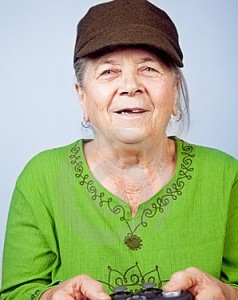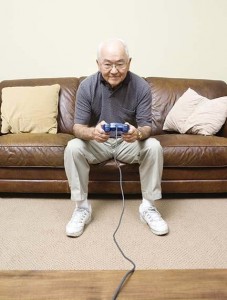Home For the Elderly: An Idea in Progress
by Orion_NGC1976, HSM guest contributor
While I was writing my first article for HSM, concerning how Home can improve the quality of one’s life and can even be therapeutic, it struck me that the elderly, who were in homes, are also trapped in their room or building and could be quite lonely, if there was no one to visit them. Just last year about this same time, TIME Magazine had an article regarding gaming and how it could possibly slow the declining mental faculties of the elderly.
The elderly are often the forgotten segment of the population, and Home may provide the thing that is needed to help liberate them and make life a more enjoyable experience.
Recently, my father-in-law had to move into an assisted living home because he could no longer be left alone for long periods of time. He lives about an hour’s drive away – and that’s during non-commute hours – otherwise, it may be as long as two hours. We, as well as his son who lives nearby, visit him often, but there are still days that go by where he is alone.
Could a Home environment help liberate elderly individuals residing in assisted living facilities? How would one go about doing this? Would it even be a good idea, given the various mental conditions that the elderly develop, such as dementia? How would one go about setting this up? These were some of the questions that came to mind.
I took the “What if” approach to see how far I would be able to develop the idea and started brainstorming. This is the list that I wrote down:
- Sell the idea.
- Equip elderly residences with PS3s.
- Demonstrate How to Use the PS3 and How to Use the Home Controls.
- Greet them in Home.
- Promotion.
Sell the Idea of Home
Selling the idea that Home would be good for the elderly homes may take some doing, as I’ve gone back-and-forth on this myself. Given that some of the people residing there are dealing with a variety of mental issues, would Home be a good idea for the elderly homes?

Not all of the residents of the elderly care homes are dealing with mental difficulties; there are many that still have strong mental capacities. Besides, there are those on Home who are already dealing with a variety of mental issues, and Home has been a positive experience for them. So this may not be a big issue, but an obstacle to convincing those that run the facilities that it is not a problem. The operators of the homes may not understand the positive aspects that Home has to offer, and a demonstration of Home would be necessary, in order to get the idea across of what Home has to offer them. They may also feel that Home may be a liability risk that they are not willing to take, and perhaps the usage on Home should be monitored to prevent someone on Home taking advantage of them, by having them divulge personal information.
Equip the Elderly Residences with PS3s
This will probably be the hardest obstacle to overcome, as it requires funding. The operators of the residences may be unwilling spend the money to buy the consoles. Would Sony be willing to donate or discount consoles, like Apple did to equip schools with computers? It is true that Apple had the added incentive of hoping to influence future computer buyers. Sony’s incentive would be the positive press they would receive from providing elderly care homes with PS3s and, hopefully, this would be enough for Sony.
Non-discounted PS3 consoles would cost $250 each. Each console would also require a video monitor. HDMI monitors usually run anywhere from $150 to $350, depending on the size of the monitor. There are also other technological considerations – besides the consoles themselves – like Internet connectivity and Wi-Fi. Wi-Fi is easier to solve than Internet connectivity, since Internet connectivity incurs a monthly charge that they may not already be paying and in their budget. This may be a showstopper, if they are not already paying for high-speed Internet.
How the IDs are set up on the consoles should also be considered and may need refining during pilot phases. For ease of use, initially the consoles would be set up with two IDs, one with a male avatar and the other with a female avatar.
Demonstrate How to Use the PS3 and How to Use the Home Controls
The Activities Director at the elderly care home would be the most likely person that would manage the consoles and show people how to use them and get around in Home. This person would need to be well versed in how to use the PS3, not only in how to get on Home, but with other things, like what to do when the PS3 freezes. The Activity Director would also need to know the ins-and-outs of getting around in Home and conversing with others.
A training course could be created with handouts to train the Activity Director. Laminated sheets with common control information could also be provided to be placed by each console, as a reference. These control reference sheets would have large print and large pictures that would be easy to read. Also printed on these cards would be the direction: “DO NOT GIVE OUT ANY PERSONAL INFORMATION AT ANYTIME,” to remind the users to not give anyone personal information on Home.
Greet Newcomers in Home
As people arrive in Home, there would need to be someone on Home that would act as a guide – similar to a HVC – for new arrivals. This could be someone at the elderly care residence, or it could be individuals in other locations on Home. These greeters would show them some the areas to visit on Home, introduce them to other people, and show them the club, if there is one. There could be a club set up to incorporate multiple care homes to provide a place for people to congregate. There could even be set times for certain group activities within Home
Promotion
Promoting the success of this would be very important, as it would generate interest that would help provide future installations. The local TV and newspaper reporters would be invited to a demonstration showing how the PS3 is being utilized in these elderly care facilities and the positive effects it has on had individuals in the care homes.
What Next?
The local assisted living facility has a mix of younger people with the elderly. I am going start there and see what interest there is and get some feedback as to how feasible implementing this would be. Feedback from the readers of this article would also very welcome.



As a seventy two year old gamer, I can tell you this: sometime in the future I will be found with a smile on my face and my PS3 controller in my cold dead fingers.
It is a brilliant idea, Orion, if you can get one in there to demonstrate. Let them each build an avatar. Show them a Harbour Studio and how to decorate it. And then take them to the shops! Sully’s Bar will be a hit. And so will the Playground. Some of the games like Orb Runner in Aurora will also have high appeal. And the dolphy racing.
The only potential drawback I can see is the cost; Home is a single-player interface, which means that a lot of PS3s and televisions might have to be purchased. Cheap USB headsets and/or cheap keyboards would be de rigeur, as well.
Aside from that one hurdle…this is brilliant. How many older people can rediscover fun activities from their youth via the magic of virtual reality? Home creatively engages people, gets them gaming, helps build social connections, and — for some — provides something to look forward to.
When I was younger, I watched my father recover from his second brain tumor operation. He played Tetris over and over. He couldn’t speak yet, his face was partially paralyzed, and the pain was beyond anything most of us could imagine. But Tetris gave his mind something to focus on and helped him rebuild his hand-eye coordination.
I keep having this image of someone who’s elderly, alone and in a retirement home. Someone who, perhaps, served his country in wartime. Someone who raised a family. Someone who, if you look through the photo albums, lived a fulfilling life.
And now he’s someone forgotten by the world, broken by age and injury, and waiting to die.
Could virtual reality give this man some joy and happiness before he gets to the end of the rainbow? Doesn’t he deserve this?
I’m actually tearing-up a little right now, just writing this. Because, *damn* it, Home isn’t just a game. And as we’ve talked about time and again here at HSM, Home genuinely affects *lives.* For the better.
;^) This is a very clever idea, and it’s obvious that you’ve given it a lot of thought.
:^/ I suggest starting out slowly, with a foot-in-the-door approach. Set your father-in-law up with his own PS3, etc., and walk him through things until he’s comfortable enough with it to introduce it to his fellow residents. Once a number of the locals are interested, bring it up with the staff, and share the details you’ve worked out already.
;^) As I’ve learned in industry, some times it’s easier to get forgiveness after the fact than it is to ge permission ahead of time…
My mother is executive director of an assisted living community that has 6 PS3’s set up for bowling and other activities, they already get lots of use for their intended purpose but I personally never thought to enlighten the residents to the fact that Home was available to them too. I’m going to have a talk with my mother about this over the weekend and figure out how to implement Home usage for those who would be interested.
What a fantastic idea, Orion!
Indeed. Glorious.
Perhaps the scientific community would be a good one to hit up with this idea.
It is known that interacting through text chat rooms, and playing video games are not only good for the cognitive, but actually assist in the improvement of mental health. Especially as the physical body becomes aged. Combining the two (as Home has done) must surely be extra beneficial in keeping a mind active and healthy, as well as helping one’s social interactions be exciting and robust.
Is this a good idea? depends.
See what I did there? LOL!
Sorry. I just had to take the hook. Great article. I like the overall voice Orion has taken. Home as therapy and a way for the elderly to connect with the outside world. I ask: why stop at Home? I think many PSN games would be great for the elderly to connect with others. Look at the multiplayer aspects of Journey. I bet many elderly would enjoy the exploratory nature of that game! And… Burnout Paradise. Common. Epic Win for elderly gamers.
I like the idea and it has been implemented as to game playing according to stevev363’s post in this thread. While I am aware of the Wii being used in nursing homes and it is popular with some residents, I never gave much thought to the PS3 (or the Sboc360 for that matter).
Is Home being used now somewhere in an assisted living or nursing home? I don’t know. I have someone in a nursing home and I don’t believe it would work for all as to PS3 Home or even gaming for that matter, but for some it would.
The article and idea is very intriguing and it is something I would look forward to seeing the results as to Orion’s What Next Comment.
Orion wrote:
“What Next?
The local assisted living facility has a mix of younger people with the elderly. I am going start there and see what interest there is and get some feedback as to how feasible implementing this would be. Feedback from the readers of this article would also very welcome.”
Go for it and good luck! : )
Xboc360m not Sboc360. Sheesh on me. : ( oh Well : )
Great idea! Great article! Try talking with volunteers at the facility (if any) and aides. They might be more open than management which may be thinking: budget, liability, etc. If you can get a groundswell going, you may find management more open. Good luck! Please keep us informed.